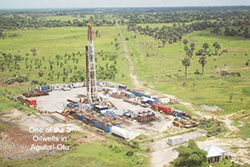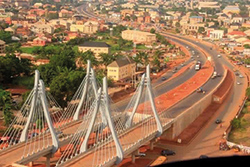Open for business
09/19/16, Biodun Omojola

Governor Obiano at a foundation-laying
ceremony
Anambra State is banishing the vestiges of Nigeria civil war with a rapid development programme spearheaded by its workaholic and focused leader Governor Willie Obiano. The state is now a haven for investors local and foreign.
Anambra State, south-east Nigeria, is a state of many firsts. It produced Nigeria's first president, Nnamdi Azikiwe; the first globally recognised Nigerian author Chinua Achebe; the first African Secretary-General of the Commonwealth, Emeka Anyaoku; and black Africa's first PhD in Radio Astronomy who discovered the radio source of Crab Nebula neutron star, Samuel Okoye. There are other notable firsts in areas as diverse as sports and visual arts. No wonder the state's sobriquet is Light of the Nation. It is no mean feat to achieve these firsts in a country with 36 states bursting at the seams with creative and brilliant citizens in the areas of commerce, governance, arts and education, among other areas of endeavour. Anambra is the state where the world famous Onitsha market is based. Goods from the market can be found across west Africa and as far afield as central Africa. And whereas Anambra State, may, for now, not be the first among equals among Nigeria's 36 states, it is aspiring to be among the top five in no distant future. And, within the past two years, it has placed itself firmly on the path towards achieving that aim, although given the parlous state of the Nigerian economy the task is monumental.
Crude oil, the country's main foreign exchange earner, is taking a major bashing at the international market with prices still hovering around $50 per barrel, compared to about S120 just over two years ago. Nigeria was then reasonably awash with petrodollars. The situation has been made worse by incessant attacks on oil facilities by militants in the oil producing areas which have reduced crude oil exports by a third of Nigeria's 2.2 million quota.
Despite this dip in national revenue, and by implication the amount allocated to states from the federal purse, Anambra state has an ace in the pack to sustain its dream and attain its vision. That ace is the banker-turned-politician Willie Obiano, governor of Anambra state. He was elected in 2014 under the platform of a minority party, All Progressive Grand Alliance, APGA, Using a four pronged approach, Obiano has steadied the economic ship of the state in just less than 30 months. It is Obiano's vision and mission to strategically position Anambra to be the top investment destination in Nigeria.
-countries.jpg)
Anambra State now exports Ugu and
Onugbu vegetables to European Union
(EU) countries
Governor Obiano hit the ground running and started to make his dream for Anambra a reality immediately he was sworn-in as the state's fourth democratically elected governor. Not a typical Nigerian politician, Obiano had a distinguished career in the country's tightly regulated financial sector, reaching the number two position in one of Nigeria's top 10 banks and had been auditor for the oil giant, Chevron/Texaco, before veering into the murky Nigerian politics. It is his background in this well-regulated and disciplined sector that has helped him to formulate his vision to help transform the fortunes of his state. Already a center of commerce especially within south-eastern Nigeria, Anambra is, however, lacking in industrial capacity to complement its status as a center of commerce in the east not to talk of the country. Consequently, Obiano identified four sectors that will assist him in actualising his dream of transforming Anambra state. These sectors are agriculture, industry, trade and commerce and oil and gas. Obiano's attention to these four sectors is not as a result of a deep study in quantum physics, they have always being there but there has been no coordinated attempt to develop them for the economic development of the state.
Almost very Nigerian state claims to be doing one thing or the other to attract investments but Anambra has gone a couple of steps further than mere rhetoric. It established a functional One-Stop-Shop agency whose job is to coordinate investment matters in the state. The agency, the Anambra State Investments Promotion and Protection Agency (ANSIPPA), has been very active pursuant to its mandate which is to make investment matters in the state seamless, simple, transparent, efficient, and devoid of the usual bureaucracy associated with government in Africa's biggest economy. According to the World Bank Doing Business in Nigeria 2016 data, Nigeria ranks 169, up from 170, out of 189 profiled economies. This is not a good score card despite claims by the Nigerian government that it is seeking to simplify regulatory frameworks, introduce market friendly policies and improve the overall ease of doing business in the country. Mauritius, for instance, ranked 28, is the best place to do business in Africa. Through ANSIPPA, however, Anambra State is trying to improve the situation. Already the state is just about Nigeria's leading investment destination with over $2 billion attracted from 16 major investments alone. /Anambra is right behind Lagos state, Nigeria's commercial capital, as the leading investment destinations in the country.

Anambra State is an oil producing state
in Nigeria and this is one of the three oil
wells discovered within the state
To better understand what Governor Obiano has achieved in just over two years in the area of investment, one needs an overview of the Anambra situation. The state, despite being the home of some of the country's business elite, was practically a virgin territory for new business. Its indigenes, master business people, rarely went home, preferring to invest in other states because the environment the state was only not business friendly but also lacked infrastructural development. There were simply no policies in place to encourage and attract potential local and international investors. In addition, there was a large pool of unemployed youths who were restive because there was nothing in the state to challenge them. Security was equally a major challenge. The crime rate was high and the state was notorious for kidnapping which kept many Anambrarians in the Diaspora away from the state. Truth be told, Anambra was not the only state with that challenge in south-east Nigeria but kidnapping was prevalent in the state.
Security is one of the major impediments to investment in developing countries globally. Nigeria, at one time, had this problem. Anambra, in particular, faced this challenge mainly because of its location - it shares borders with about five states - and also because of its importance in commerce: two of its cities, Onitsha, a fast growing commercial city and Nnewi, known as the Taiwan of Nigeria, are huge centres of business. Governor Obiano recognised this and, in his first year, made security his top priority - he called it "the number one enabler" - knowing full well the positive fall-outs of a crime-free state. Today, under Governor Obiano, Anambra state is regarded as the "safest state in Nigeria" and following closely behind that realisation is investment money.
Governor Obiano told Africa Today, in an exclusive interview in Awka, the state capital, that "Before I took over (Anambra) was almost a failed state because nobody wanted to come home - crime was high, kidnappers were on the prowl here and it affected the peoples' psychology. Nobody wanted to come home including myself and I felt if my vision to make Anambra State the first choice investment destination in the country is to be fulfilled then insecurity must be very seriously dealt with and I went at it with a sledgehammer and won that fight very decisively and I am still fighting because fighting crime is something that is continuous if you want to be on top of it."
Obiano, as the state chief security officer, has made sure the police are well funded and equipped and are assisted by various quasi-military organisations established by the administration. The downward trend of crimes and the sense of security that is obvious in the state, coupled with ANSIPPA's one-stop-shop system have led to massive injection of investment capital into many sectors. Investors, both local and international, now see the state's potentials and are keen to tap into it.
A curious view of investing companies and their capital inflow indicate how ANSIPPA has been able to live up to its mandate: Excel Farms ($100 million), Joseph Agro ($200 million) and Coscharis Farms ($140 million) in agriculture, Cardinal Developers ($115 million) in hospitality, Africa Project Finance Development ($250 million) in tourism, Falcon Corporation ($100 million) and UD Integrated Petroleum ($150 million) in oil and gas, Richborn Nigeria ($40 million) in automobile and Sgn Asset Holding (S320 million) in (commercial real estate) are some of the companies that have made the state their home in recent times. ANSIPPA's chief executive, Joe Billie Ekwunife told Africa Today that investing in the state is very simple. Though not identified in the governor's economic development plan, logistics seems to be the fifth pillar. There is a plan underway to build an international cargo airport in other to make the state a hub in the southeast region. No doubt the airport will be of immense service to the businesses springing up in the state.

Governor Obiano has within a short
period of coming to office transformed
Anambra State capital city of Awka with
magnificent bridges like this one to ease
traffic.
So far most of the investment is in agriculture but oil and gas is also receiving a good chunk of the investment capital. The state has three functional oil wells and a vast reserve of gas said to be in the region of 30 billion cubic feet. Its oil reserves, according to Alexander's Gas & Oil Connection, is in the neighbourhood of one billion barrels. This is pretty significant for a state with three functional wells. Governor Obiano is basing one of his major projects on this. He is planning a refinery that will refine about 55,000 bpd, enough to satisfy the demand of the south-east region in petroleum products. An aviation fuel dump is also to be established for airliners. Obiano hopes to divert a lot of the airlines that take aviation fuel in Lagos to the state. For these projects, partners are already waiting in the wings to begin work using the Build, Operate and Transfer (BOT) system, once the base stock has reached an acceptable level. "That is the bankers' style," says Obiano.
In agriculture, the state is not only bringing in investors, it is also a trail blazer as it is the only Nigerian state exporting vegetables (bitter leaf and ugu (spinach) to the United Kingdom. It has been noted that only an efficient organisation can export vegetables to Europe without objections from the strict regulatory authorities like the European Food Safety Authority. The value of vegetable export has so far exceeded $5 million. In addition rice production has increased by a whopping 2,500 percent - from 8000 metric tonnes to 210,000 just in two years and will undoubtedly further shoot up once the farms that have signed MoUs with the government on rice farming begin operations. Rice produced in the state recently emerged the best rice in Africa, besting rice from such other countries as South Africa, Egypt, Ghana, Morocco, Namibia and Cameroon, at an African Products Forum in Lagos.
These two sectors - oil & gas and agriculture - are allowing investors to take a critical look at the state. Among those looking at the state at the moment are Chinese companies which are hoping to invest in power, agriculture, health and oil and gas. Recently a delegation from China-CAMC Engineering Limited and some finance partners facilitated by the United Nations Industrial Development Organisation (UNIDO) expressed their interest to partner the state in these sectors. The Chinese delegation also highlighted the construction of airport and other transport systems, particularly in intercity and inter-state rail projects. Leader of the delegation, Yu Tao, said with the level of development in the state, the delegation made the right choice going to Anambra state. Investors from Thailand have also been in the state and are looking at agriculture, healthcare, waste management and oil and gas. But like the Charles Dickens character, Oliver Twist, Governor Obiano is asking for more. He wants more investment in tourism, power, waste management and industry.

Former Nigerian Head of State General
Abdulsalam Abubakar came calling. He
gave an endorsement to Governor
Obiano's performance
Many are pleased with the transformation that is unfolding in Anambra state. Oby Ezekwesili, a former Nigerian minister and once vice president of the World Bank's Africa Division is one of such people. Regarded as a stickler for due process, Ezekwesili is impressed by what Obiano has done especially in the area of formulating policies that would harness scare resources for the common good. She remarked that "a lot of time, in development economics, people don't focus on evidence based policy making. And because that does not happen, so much resource gets wasted in resource-scarce environments," but "by using analysis and data as the parameter for determining your policy choices, I can see some of the results. For example the focus on Teacher Quality - 70 percent of the result of what informs the learning outcome of the children in a school system is based on the quality of the teachers."
Pat Utomi, a professor of political economy and former presidential candidate, is also equally impressed by Obiano's achievements in a short period. A harsh critic of governors of the region Utomi is impressed by the development strides made in Anambra state. "I am one who has been very critical of the governors of the south east for a very long time. I think development needs to move out of Lagos. Lagos is now responsible for more than 70 percent of Nigeria's economy and a good part of those who make that happen come from the south east. If the governors won't create an enabling environment for them to create back home what they are building elsewhere, something is wrong. I am pleased to see the progress that has been made in Anambra," adding that "Willie is Working."
"Willie is Working" is a commonly used phrase in the state, a reference to Governor Obiano's on-going transformation of the state. His achievements are also noticeable in other sectors - education, healthcare, social development, security, transportation and job creation, among others. For instance, the state has not only created more jobs it has increased salaries of civil servants by about 15 percent and met its obligation to them as at when due. This is at a time when, at least, 27 states of the federation have challenges in paying staff salaries.
A drive around the state belies its past. Anambra, then part of the old east central state from which Enugu and Anambra states were carved out from, was the epicentre of the Nigerian civil war of 1967 to 1970. Some of its towns were major theatres of the 30-month war. Nnewi was the technological hub of the short-lived Republic of Biafra while Uli was the site of the landing strip used extensively to bring in relief supplies during the war. Awka, the capital of Anambra, is undergoing a renaissance with major construction of roads and bridges helping to change the city's landscape. The state's road network is impressive. There are simply no vestiges of the war as the state is now fully integrated into the Nigerian society. Making integration easier is an urbane governor who is creating a social and business friendly environment where indigenes and non-indigenes alike can find wealth creating opportunities.
Perhaps now that Anambra state has a futurist as a governor, its potentials will finally be realised. It has the people, the land and now the leader. Anambra is calling!
Comment on this story



